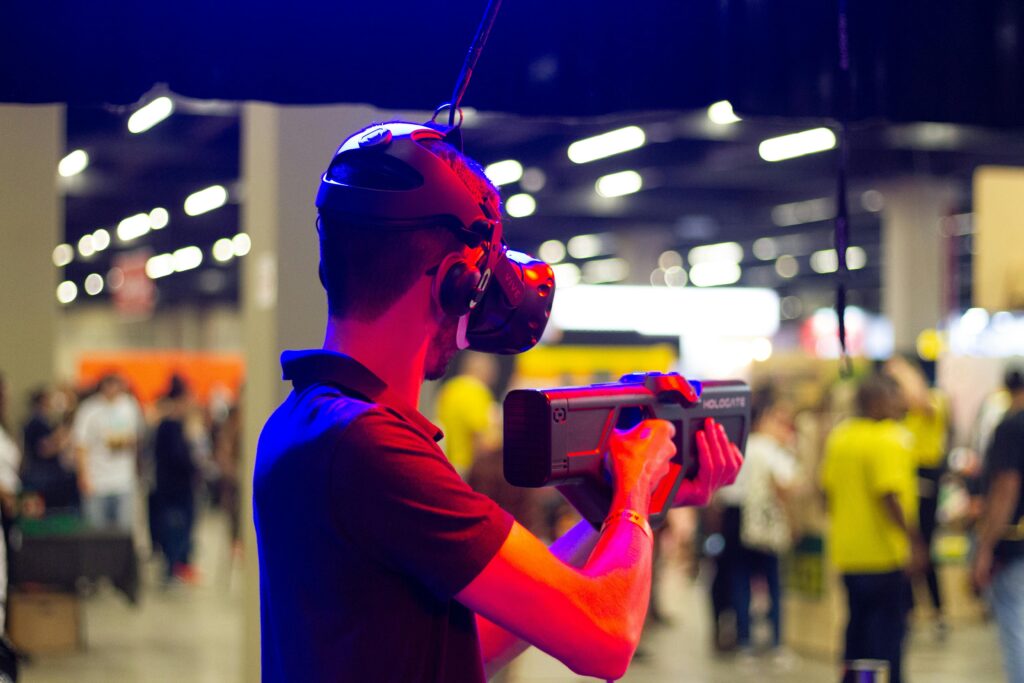The concept of the metaverse—a vast, interconnected digital world where people can interact, work, and play in real-time—is no longer confined to science fiction. With advancements in virtual reality (VR), augmented reality (AR), and blockchain technologies, the metaverse is quickly becoming a reality. Among the industries poised for the most significant transformation is online gaming.
Online gaming and the metaverse share a common goal: to create immersive, interactive experiences that captivate users. But the metaverse takes this a step further, offering players the chance to engage in persistent, shared virtual spaces that go beyond traditional gameplay. In this article, we’ll explore how the metaverse is set to revolutionize the future of online gaming and what this means for players, developers, and the gaming industry as a whole.
What is the Metaverse?
The metaverse is a collective virtual space where users can interact with each other and digital environments in real time. It combines elements of:
- Virtual Reality (VR): Fully immersive 3D worlds.
- Augmented Reality (AR): Enhancing real-world environments with digital overlays.
- Blockchain Technology: Enabling decentralized ownership of assets.
- Artificial Intelligence (AI): Powering smarter, more interactive virtual worlds.
In gaming, the metaverse aims to create a seamless blend of gaming, social interaction, and virtual economies. Unlike standalone games, the metaverse connects multiple gaming worlds and activities into one persistent digital universe.
How the Metaverse Will Transform Online Gaming
1. Enhanced Immersion
The metaverse is set to take gaming immersion to a whole new level.
- Virtual Reality Gaming: Players can step directly into their favorite games using VR headsets, experiencing battles, exploration, and challenges as if they were real.
- Haptic Technology: Wearable devices will allow players to feel the physical sensations of their virtual actions, from the recoil of a weapon to the texture of virtual objects.
2. Persistent Game Worlds
In the metaverse, gaming worlds won’t simply reset when you log out. Instead, they will continue to evolve and change in real time.
- Example: In a multiplayer game, the progress made by players—such as a city built or an enemy defeated—will persist for others to see and interact with.
- Impact: This makes gaming worlds feel more alive and interconnected, encouraging players to invest more time and creativity into their virtual spaces.
3. Cross-Game Interoperability
One of the most exciting features of the metaverse is its ability to connect multiple games and platforms.
- Shared Avatars and Items: Players could use the same avatar or items across different games, creating a unified virtual identity.
- Example: A sword earned in one game could be used as a decorative item in another.
4. Virtual Economies and Play-to-Earn Models
The metaverse will integrate virtual economies into gaming on an unprecedented scale.
- Blockchain Integration: Players will own in-game assets as NFTs (non-fungible tokens), giving them real-world value and allowing them to trade, sell, or rent these assets.
- Play-to-Earn Gaming: Players can earn cryptocurrency or other rewards for their time and effort in games.
- Example: Games like Axie Infinity already allow players to earn income by breeding, battling, and trading digital pets.
5. Social Interaction in Gaming
The metaverse will transform online games into social hubs where players can meet, chat, and collaborate.
- Virtual Hangouts: Players will have the ability to host meetups, parties, or even concerts within game worlds.
- Real-Time Communication: Enhanced voice and gesture recognition will allow for more natural interactions.
- Shared Experiences: Gaming will become more collaborative, with players teaming up for quests or simply exploring worlds together.
Games and Platforms Leading the Way
Several games and platforms are already laying the groundwork for the metaverse:
1. Roblox
Roblox has become a hub for user-generated content and virtual social experiences.
- Why It’s a Leader: Players can create their own games, participate in virtual events, and monetize their creations.
2. Fortnite
Epic Games’ Fortnite has evolved beyond a battle royale game, hosting virtual concerts and events that attract millions of players.
- Metaverse Features: Cross-platform play, immersive events, and a persistent world.
3. Decentraland
Decentraland is a blockchain-based virtual world where users can buy, sell, and build on virtual land.
- Metaverse Features: Decentralized ownership of assets, virtual marketplaces, and customizable environments.
4. Horizon Worlds
Meta (formerly Facebook) has developed Horizon Worlds as a social VR platform where users can build and explore virtual spaces.
- Metaverse Features: VR-based interactions, customizable avatars, and collaborative environments.
Benefits of the Metaverse for Gamers
1. Greater Freedom and Creativity
The metaverse allows players to create their own content, from designing levels to crafting unique in-game items.
2. Ownership of Digital Assets
Blockchain technology ensures that players truly own their digital assets, which they can trade, sell, or transfer.
3. A More Personalized Experience
Customizable avatars, homes, and gaming worlds make each player’s experience unique.
4. Opportunities to Earn
Play-to-earn models and virtual economies offer financial incentives for gamers.
Challenges and Concerns
1. High Entry Costs
Devices like VR headsets or haptic suits can be expensive, potentially limiting access for some players.
2. Privacy and Security Issues
The metaverse requires users to share significant amounts of data, raising concerns about privacy and data breaches.
3. Digital Addiction
The immersive nature of the metaverse may lead to increased screen time and digital addiction.
4. Uneven Accessibility
Players in regions with limited internet access or outdated technology may struggle to participate in the metaverse.
The Future of Online Gaming in the Metaverse
The metaverse is not just a trend—it’s the future of online gaming. Here are some developments to look forward to:
1. Fully Immersive Worlds
With advancements in VR and AR, gaming worlds will become indistinguishable from reality.
2. AI-Driven NPCs
Non-player characters (NPCs) in the metaverse will use AI to interact more naturally with players, creating dynamic and unpredictable experiences.
3. Cross-Platform Play
Games will increasingly allow players to compete or collaborate across devices, from PCs to consoles and smartphones.
4. Expanding Esports in the Metaverse
Esports tournaments in the metaverse will feature massive virtual arenas where fans can watch and interact with players in real time.



